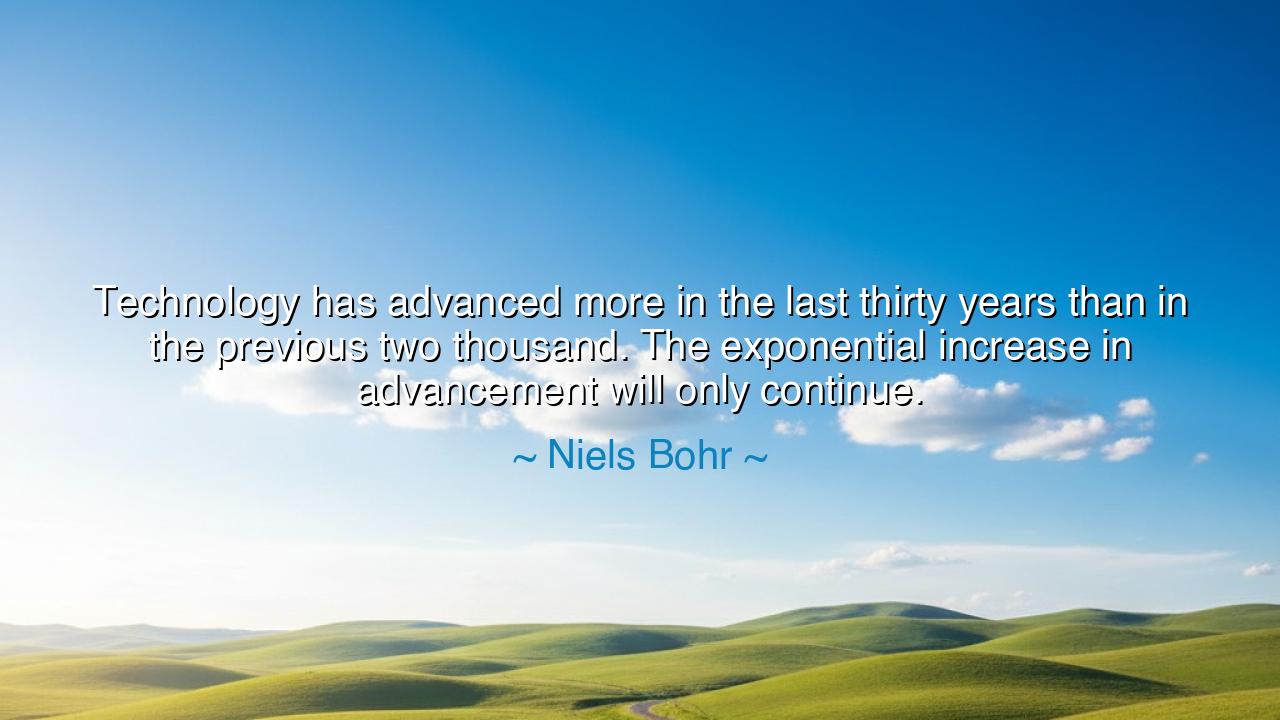
Technology has advanced more in the last thirty years than in
Technology has advanced more in the last thirty years than in the previous two thousand. The exponential increase in advancement will only continue.






The physicist Niels Bohr, one of the guiding lights of the atomic age, is often credited with words that ring like prophecy: “Technology has advanced more in the last thirty years than in the previous two thousand. The exponential increase in advancement will only continue.” In this declaration, he captures the staggering pace of technological progress, a pace so swift that it defies the slow rhythms of human history. What once took centuries of toil and invention is now surpassed in mere decades, and this acceleration promises not rest, but ever-greater momentum.
To say that the last thirty years eclipsed two thousand is to compare the long march of antiquity with the sudden sprint of modernity. For thousands of years, humanity lived with the plow, the sail, the candle, and the horse. Then, in the space of a single generation, man split the atom, soared into space, summoned information from invisible waves, and bound the world together with digital threads. The curve of progress no longer rises gently — it explodes upward, driven by discoveries that multiply upon themselves. This is what Bohr saw: not linear growth, but exponential growth.
History itself provides the evidence. Consider the leap from the Wright brothers’ flight in 1903 to the moon landing in 1969. In less than seventy years — a single lifetime — humanity moved from fragile wood and cloth in the air to planting a flag upon another world. Compare that to the thousands of years it took to move from the chariot to the galleon, or from the torch to the printing press. Bohr’s words remind us that each new discovery accelerates the next, and thus the future approaches faster than the past ever did.
Yet with this truth comes a duality. The exponential increase in advancement carries both wonder and peril. The same nuclear physics that brought electricity to cities also created weapons that could end civilization in hours. The same computers that connect billions also carry the power to manipulate, to enslave, to corrupt. With exponential growth comes exponential responsibility. The sword in our hands gleams with promise but drips with danger. Bohr, as one who unlocked the secrets of the atom, understood this burden more than most.
One need only recall the story of the Manhattan Project. Scientists, driven by the passion of discovery, created the most destructive force the world had ever seen. Their work advanced physics beyond measure, but at a terrible cost. Hiroshima and Nagasaki stand as monuments to the truth that progress without foresight can be catastrophic. Bohr himself urged for openness and cooperation, warning that such knowledge could not be contained by walls of secrecy. His call echoes even today: wisdom must grow as swiftly as technology.
The lesson for us is this: do not be blinded by wonder alone. The exponential growth of technology is inevitable, but whether it becomes blessing or curse depends upon our character. We must cultivate ethics as diligently as we cultivate invention. We must prepare our souls to match the speed of our machines. To marvel at progress is natural, but to master it with wisdom is necessary.
Therefore, O children of tomorrow, hear the voice of Niels Bohr. “The exponential increase in advancement will only continue.” Do not cower before this truth, nor revel in it blindly. Instead, rise to meet it with humility, patience, and vision. Let your progress be guided not only by curiosity, but by conscience. For if your wisdom grows as swiftly as your tools, then the future will shine not as a devouring fire, but as a radiant dawn for all humankind.






AAdministratorAdministrator
Welcome, honored guests. Please leave a comment, we will respond soon